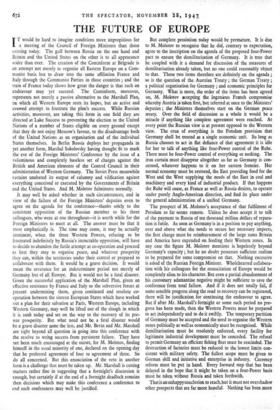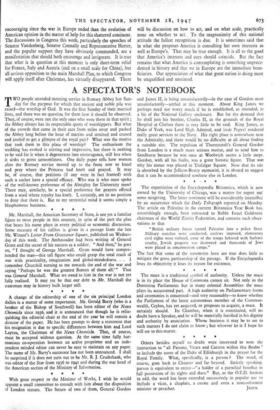THE FUTURE OF EUROPE
IT would be hard to imagine conditions more unpropitious for a meeting of the Council of Foreign Ministers than those existing today. The gulf between Russia on the one hand and Britain and the United States on the other is to all appearance wider than ever. The creation of the Cominform at Belgrade is an attempt not merely to organise all Eastern Europe on a Com- munist basis but to draw into the same affiliation France and Italy through the Communist Parties in those countries ; and the state of France today shows how great the danger is that such an endeavour may yet succeed. The Cominform, moreover, represents not merely a passive alternative to the Marshall Plan, on which all Western Europe rests its hopes, but an active and avowed attempt to frustrate the plan's success. While Russian activities, moreover, are taking this form in one field they are directed at Lake Success to preventing the election to the United Nations of a number of States eligible on every ground except that they do not enjoy Moscow's favour, to the disadvantage both of the United Nations as an organisation and of the individual States themselves. In Berlin Russia deploys her propaganda in yet another form, Marshal Sokolovsky having thought fit to mark the eve of the Foreign Ministers' Conference by the issue of a voluminous and completely baseless set of charges against the British and American elements of the Control Council in their administration of Western Germany. The Soviet Press meanwhile sustains unabated its output of calumny and vilification against everything conceived or executed by the Governments of Britain and the United States. And M. Molotov fulminates normally.
It may well be asked whether in such circumstances, and in view of the failure of the Foreign Ministers' deputies even to agree on the agenda for the conference—thanks solely to the consistent opposition of the Russian member to his three colleagues, who were at one throughout—it is worth while for the Foreign Ministers to meet at all. The answer must be that it most emphatically is. The time may come, it may be actually imminent, when the three Western Powers, refusing to be frustrated indefinitely by Russia's intractable opposition, will have to decide to abandon the futile attempt at co-operation and proceed as best they may to organise peace, and whatever prosperity they can, within the territories under their control or prepared to collaborate with them. It would be a grave decision. It would mean the severance for an indeterminate period not merely of Germany but of all Europe. But it would not be a fatal disaster. Given the successful application of the Marshall Plan, given an effective resistance by France and Italy to the subversive forces at present undermining them, given continued and resolute co- operation between the sixteen European States which have worked out a plan for their salvation at Paris, Western Europe, including Western Germany, may well be lifted out of the slough in which it is sunk today and set on the way to the recovery of its pre- war prosperity. But what need not be a fatal disaster would be a grave disaster none the less, and Mr. Bevin and Mr. Marshall are right beyond all question in going into this conference with the resolve to wring success from persistent failure. They have not been much encouraged at the outset, for M. Molotov, finding himself in the usual minority of one, declared on the opening day that he preferred agreement of four to agreement of three. So do all concerned. But this enunciation of the veto in another form is a challenge that must be taken up. Mr. Marshall is cutting matters rather fine in suggesting that a fortnight's discussion is enough, but certainly if at the end of a fortnight deadlock remains then decisions which may make this conference a conference to end such conferences may well be justified. But complete pessimism today would be premature. It is due to M. Molotov to recognise that he did, contrary to expectation, agree to the inscription on the agenda of the proposed four-Power pact to ensure the demilitarisation of Germany It is true that he coupled with it a demand for discussion of the measures of demilitarisation already taken, but no one could reasonably object to that. Those two items therefore are definitely on the agenda ; so is the question of the Austrian Treaty ; the German Treaty ; a political organisation for Germany ; and economic principles for Germany. What is more, the order of the items has been agreed on, M. Molotov accepting the ingenious Franch compromise whereby Austria is taken first, but referred at once to the Ministers' deputies ; the Ministers themselves start on the German peace treaty. Over the field of discussion as a whole it would be a miracle if anything like complete agreement were reached. At every point the Russian view is at present opposed to the Western view. The crux of everything is the Potsdam provision that Germany shall be treated as a single economic unit. So long as Russia chooses to act in flat defiance of that agreement it is idle for her to talk of anything like four-Power control of the Ruhr. There must be four-Power control of everything or nothing. The iron curtain must disappear altogether so far as Germany is con- cerned, whatever happens to it on her eastern frontier. Her normal economy must be restored, the East providing food for the West and the West supplying the needs of the East in coal and machinery and every kind of industrial product. If that happens the Ruhr will cease, as France as well as Russia desires, to operate under purely Anglo-American direction, and find its place under the general administration of a unified Germany.
The prospect of M. Molotov's acceptance of that fulfilment of Potsdam so far seems remote. Unless he does accept it to talk of the payment to Russia of ten thousand million dollars of repara- tion is futile. As soon as Germany is in a position to pay anything, over and above what she needs to secure her necessary imports, the first charge must be reimbursement of the large sums Britain and America have expended on feeding their Western zones. In any case the figure M. Molotov mentions is hopelessly beyond Germany's capacity ; but he no doubt possesses sufficient realism to be prepared for some compromise on that. Nothing excessive is asked of the Russian Foreign Minister. Wholehearted collabora- tion with his colleagues for the resuscitation of Europe would be completely alien to his character. But even a partial abandonment of his customary adamantine negative might be sufficient to save the conference from total failure. And if it does not totally fail, if some sensible progress along the road to recovery can be registered, there will be justification for continuing the endeavour to agree. But if after Mr. Marshall's fortnight or some such period no pro- gress has been made, then the Western Powers must be prepared to act independently and to do it swiftly. The temporary partition of Germany must be accepted and the need to organise the Western zones politically as well as economically must be recognised. While demilitarisation must be resolutely enforced, every facility for legitimate industrial development must be conceded. The refusal to permit Germany an efficient fishing fleet must be rescinded. The destruction of factories must be reduced to the lowest limits con- sistent with military safety. The fullest scope must be given to German skill and initiative and enterprise in industry. Currency reform must be put in hand. Every forward step that has been delayed in the hope that it might be taken on a four-Power basis must be taken without Russia and taken forthwith.
That is an unhappyconclusion to reach,but it must not overshadow other prospects that are far more hopeful. Nothing has been more encouraging since the war in Europe ended than the evolution of American opinion in the matter of help for this shattered continent. The discussions in Congress this week, particularly the speeches of Senator Vandenberg, Senator Connally and Representative Herter, and the popular support they have obviously commanded, are a manifestation that should both encourage and invigorate. It is true that what is in question at this moment is only short-term relief for France, Italy and Austria (and on a small scale for China), but all serious opposition to the main Marshall Plan, to which Congress will apply itself after Christmas, has virtually disappeared. There will be discussion on how to act, and on what scale, practically none on whether to act. To the magnanimity of this national attitude the fullest recognition is due. It is sometimes said that in what she proposes America is consulting her own interests as well as Europe's.' That may be true enough. It is all to the good that America's interests and ours should coincide. But the fact remains that what America is contemplating is something unprece- dented in history and that we in Europe are the immediate bene- ficiaries. Our appreciation of what that great nation is doing must be unqualified and unstinted.





























 Previous page
Previous page